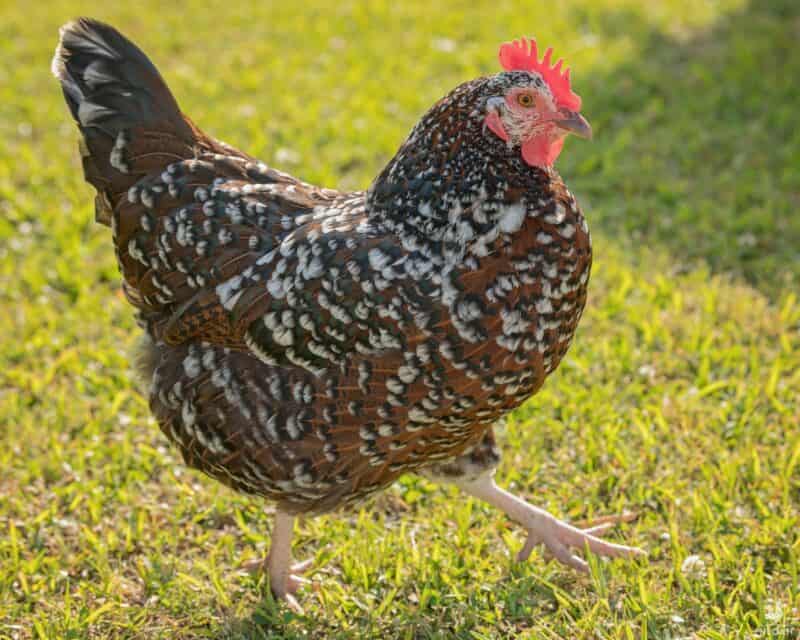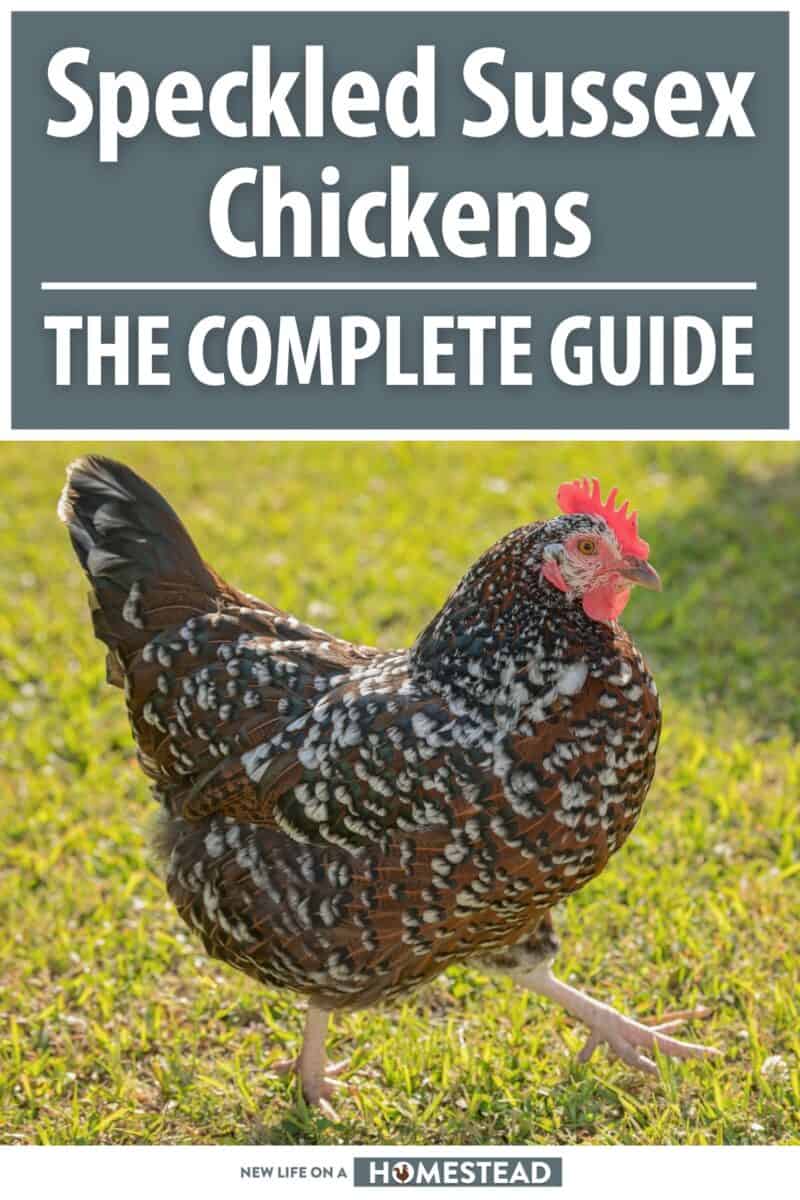The Sussex chicken originated in the historic county of Sussex, England. Just as Sussex is one of the oldest counties in England, it’s also one of the oldest British chicken breeds.

First described as “Kent Fowl” or “Old Sussex,” these birds were some of the first shown in poultry shows, first exhibited at the London Zoo’s inaugural poultry show in 1845.
Despite their origins, Speckled Sussex chickens remain popular today. They are quite breathtaking to behold, with snow-white feathers and a black-and-white crest around the head.
But are these chickens right for you? If you’re on the hunt for the perfect chicken breed for your backyard or small farm, look no further – this complete guide to the Speckled Sussex chicken will tell you everything you need to know…
Table of Contents:
What is the Speckled Sussex Chicken?
So what makes the Speckled Sussex chicken so special? For starters, their striking appearance is hard to miss.
Their feathers are a mix of rich browns, creamy whites, and deep blacks, creating an eye-catching pattern that’s truly unique.
But looks aren’t everything – these birds are also incredibly resilient and adaptable.
They can handle a range of climates and are known to be good foragers, meaning they’ll often forage for food and aren’t strictly dependent on your supply.
Another great thing about Speckled Sussex chickens is that they’re good layers. On average, you can expect about four or five eggs per week per bird, which is a respectable amount.
And if you’re looking for a breed that’s easy to raise, rest assured that Speckled Sussex chickens are generally low-maintenance.
They don’t tend to be aggressive towards other chickens or humans, and are a docile and friendly breed overall.
But one of the most noteworthy qualities of the Speckled Sussex chicken is its hardiness.
These birds can tolerate both cold and hot temperatures, and won’t easily succumb to various illnesses that often affect other breeds.
Their adaptability means that you won’t have to worry too much about providing the perfect set up for them, as they’re able to make do with different environments.
What is the History of Speckled Sussex Chickens?
Speckled Sussex chickens originated in the Sussex county of South-East England and were first recorded in the late 1600s.
The breed quickly became popular among farmers due to its versatility and ability to thrive in a range of climates.
Speckled Sussex chickens were known for their excellent egg production, with hens laying up to 260 large brown eggs per year!
This made them ideal farm animals, as they contributed to food sources while also providing a natural pest control solution for gardens and crops.
During the Victorian era, Speckled Sussex chickens became a symbol of status among the wealthy, who bred them as show birds.
The breed’s distinctive speckled pattern and unique personality made them a favorite among poultry enthusiasts, leading to increased interest in the breed and improved bloodlines.
The popularity of Speckled Sussex chickens eventually spread to North America, where they became a common breed among homesteaders.
During World War II, Speckled Sussex chickens played an important role in the war effort by providing a source of protein for soldiers overseas and civilians at home.
Their hardiness and ability to thrive in a variety of conditions made them perfect for sustaining the troops and contributing to the war effort.
Today, Speckled Sussex chickens are still a beloved breed among chicken enthusiasts and homesteaders. They’re known for their friendly personalities, hardiness, and beautiful speckled feathers.
While no longer as popular as they once were, Speckled Sussex chickens continue to thrive and contribute to the world of backyard chicken keeping.
What Are Speckled Sussex Chickens Good For?
Let’s start with the obvious – speckled Sussex chickens are stunning to look at. Their feathers are a beautiful mix of mahogany, white, and black, which gives them a unique and eye-catching appearance.
Plus, they’re incredibly photogenic, so you’ll never run out of content for your Instagram feed!
Speckled Sussex chickens are considered to be a dual-purpose breed. This means that they’re great for both meat and egg production.
They produce large, brown eggs that are delicious and nutritious, and they also have a good amount of meat on them.
So, if you’re looking for a breed that can give you the best of both worlds, Speckled Sussex chickens are it.
Let’s face it – chickens are just plain fun to have around. They’re quirky, entertaining, and surprisingly intelligent. Speckled Sussex chickens are no exception.
They’re known for their curious and playful personalities, and they’ll keep you entertained for hours with their antics.
Plus, they’re great at pest control, so they’ll help keep your garden free of bugs and other creepy crawlies.
What Do Speckled Sussex Chickens Look Like?
Here’s a quick overview of what to expect.
Size and Weight of Speckled Sussex Chickens
Speckled Sussex chickens are considered to be medium-sized birds. They have a broad, plump body and a short, stout beak.
Female Speckled Sussex chickens weigh around 6-7 pounds, while males can grow up to 7-8 pounds.
These chickens are strong and sturdy, which makes them fantastic foragers and active foragers. They’re also resistant to many common poultry diseases and can withstand cold weather.
What Colors Do Speckled Sussex Chickens Come In?
As their name suggests, Speckled Sussex chickens are covered in eye-catching speckles. Their feathers are predominantly white, with black spots scattered throughout the upper portions of the plumage.
These dots can vary in size and shape, adding to the individuality of each bird’s feathering pattern.
Younger Speckled Sussex chickens have a different appearance than adults and feature soft, ivory feathers that gradually darken into their signature speckles.
Egg Laying and Temperament
First and foremost, Speckled Sussex chickens are known for being friendly and docile. When raised properly, they will happily socialize with other chickens and even humans.
You’ll often find them following you around the coop, hoping for a scratch behind the ears (or rather, feathers)!
This makes them an ideal addition to a family flock or even for those living in urban areas where neighbors may be concerned about noisy or aggressive chickens.
They are also quite adventurous. They enjoy exploring their surroundings and are curious by nature. This means they will happily scratch the ground for food, hunt bugs, and even jump up on ledges.
However, it’s important to make sure their living space is secure and safe, as they can be susceptible to predators due to their friendly nature.
Finally, these birds adapt well to different environments. They are hardy birds that can withstand cold weather and forage for food even in adverse conditions.
This is great news for those who live in areas with harsh winters.
Now, on to the eggs…
Are Speckled Sussex Good Egg Layers?
While Speckled Sussex chickens don’t lay as many eggs per year as some breeds, such as Leghorns or Rhode Island Reds, they’re known for producing a consistent number of eggs.
You’ll get around 180 to 200 tinted eggs per year, though it’s not uncommon to get up to 250.
What Color Eggs Do Speckled Sussex Lay?
Speckled Sussex eggs are a light brown color and are medium to large in size. If you are looking for a beautiful and tasty addition to your morning omelet, then the Speckled Sussex’s eggs are sure to hit the spot.
When Do Speckled Sussex Start Laying?
It takes quite some time before the Speckled Sussex reaches maturity and starts laying eggs compared to other ultra-fast-maturing breeds like Leghorns or White Plymouth Rock.
However, good things take time, and it’s worth the wait. When they do start laying eggs, you’ll find that they lay roughly four eggs per week.
How Long Do Speckled Sussex Lay Eggs For?
Typically, speckled Sussex hens will lay consistently for the first two to three years of their lives. After that, their egg production will start to slow down.
However, some hens can continue to lay well into their fourth or fifth year, especially if given the proper care and diet.
During the summer months, when days are longer and the weather is warmer, speckled Sussex hens will produce more eggs than during the winter.
This is because they need a certain amount of daylight to stimulate their reproductive systems.
So, if you want to get the most out of your speckled Sussex hens, make sure they have access to plenty of sunlight.
Can You Raise Speckled Sussex for Meat?
While they may not produce meat as quickly or efficiently as some of the other breeds, they are still an excellent choice for small-scale meat production.
Keep in mind that their diet and living conditions make a significant difference in the quality of their meat.
You must feed them a healthy diet of commercial chicken feed, and offer them plenty of outdoor space to roam and graze, which enhances the flavor and texture of their meat.
It’s essential to select the right age and weight when raising Speckled Sussex for meat. The perfect age for processing the birds is around 14 – 20 weeks since they would have reached their maximum growth and weight.
Although they may not be as large as other meat-breed chickens, raising Speckled Sussex for meat is still a viable option, especially if you’re looking for a sustainable, ethical, and organic meat source.
Tips to Help You Care for Speckled Sussex Chickens
Here are some helpful tips when it comes to caring for Speckled Sussex chickens.
What Do Speckled Sussex Chickens Eat? Feeding and Nutritional Needs
As with any living being, proper nutrition is key to ensuring your birds stay healthy.
These birds will eat just about anything, but you should consider providing a well-balanced diet for your chickens to ensure they get the necessary nutrients.
Typically, a good layer feed is all you need for this breed of chicken – you can also add greens, fruits, and vegetables as a supplement. Avoid giving them foods like chocolate, avocado, or citrus fruits, which can be harmful.
Health Concerns and Predators
Like any other bird, Speckled Sussex chickens are prone to various health concerns. Some common issues include lice, mites, and worms. Be on the lookout for signs of redness or irritation on their skin, or if they seem itchy.
Regularly inspect and clean their coop to prevent the buildup of bacteria and disease. Make sure they have plenty of space to move around, as overcrowding can also lead to health issues.
Unfortunately, chickens, including Speckled Sussex, are prey animals – and they can fall victim to predators pretty quickly.
Sorry, it doesn’t matter how beautiful they are! The predators just don’t care.
Common predators include foxes, raccoons, and hawks. The coop should have sturdy, predator-proof walls, doors, and locks to keep predators out.
I’ve found that it’s also helpful to add electric fencing around the coop perimeter, or to install motion-activated lights to deter nighttime predators.
These two simple steps go a long way in keeping predators away from your flock.
Let Them Free Range
Speckled Sussex chickens love to scratch and roam, so it’s essential to give them plenty of space to do so.
Ideally, you should let your chickens free-range in a safe and fenced-in area. If that’s not possible, make sure they have access to a large run where they can move around freely.
Spend Time With Your Birds
Not all birds are social creatures, but Speckled Sussex chickens definitely are. That’s why they’re often raised as exhibition animals, in fact.
These chickens genuinely enjoy the company of humans. So, take some time each day to sit with your birds and watch them scratch and peck around.
You can also offer them some treats, such as mealworms or corn, which they’ll love.
How Long Do Speckled Sussex Chickens Live?
The answer to this question isn’t super straightforward, as there are a few different factors you’ll need to consider…
As with any living thing, genetics play a vital role. Generally, speckled Sussex chickens are robust and hardy birds.
They were initially bred as dual-purpose chickens for both meat and egg production. This breeding has resulted in a hardy bird that can withstand various weather conditions.
With proper care, your speckled Sussex chicken can live up to 8 years.
That said, your hens won’t be productive for that long, so if you’re raising chickens for eggs, you’ll want to think about what you’ll do with your birds once they’re no longer laying.
It’s completely fine to continue raising them as pets, but some farmers choose to send their productive hens to the stew pot.
Is the Speckled Sussex Right for You?
First, let’s start with the pros. If you’re looking for a bird that’s both docile and friendly, the Speckled Sussex is perfect.
They’re known for being a great choice for families with young children because of their gentle demeanor.
Plus, they’re fantastic layers, producing around four medium-sized brown eggs per week. They also transition well to both free-range and confinement settings.
As for cons go – while they’re friendly, the Speckled Sussex breed can become broody, meaning the hens may choose to sit on their eggs rather than lay them.
This can be a bit of a nuisance for those looking for a productive hen.
One of the unique features of the Speckled Sussex is that they’re known to be quite vocal! While they won’t be waking up the entire neighborhood, they do like to chat with their fellow poultry pals – at all hours of the day and night.
If you thought roosters were the only chickens who liked to cause a ruckus, believe me when I tell you – these hens are seriously chatty.
They’re also known to be very curious birds, which in some cases can lead to a bit of mischief. Expect your Speckled Sussex to investigate and interact with both people and objects in their environment!
That said, one of the top reasons people choose the Speckled Sussex is their hardiness. This breed is perfect for those who live in areas with changing seasons or colder climates.
They’re known to be incredibly durable, and are able to weather most conditions and climates, making them an all-around great chicken to have.
If you’re considering adding a Speckled Sussex chicken to your flock, it’s always best to buy from a reputable breeder who can provide you with healthy, well-cared-for birds.
All in all, the Speckled Sussex chicken is a versatile, attractive, and easy-to-raise breed that any backyard chicken lover should seriously consider.
Whether you’re looking to add some visual interest to your flock or simply want a reliable, low-maintenance bird, these chickens are an excellent choice.
So why not give them a try and see for yourself why they’ve been charming chicken keepers for centuries! They’ve definitely won me over, to say the least.


Rebekah is a high-school English teacher n New York, where she lives on a 22 acre homestead. She raises and grows chickens, bees, and veggies such as zucchini (among other things).
